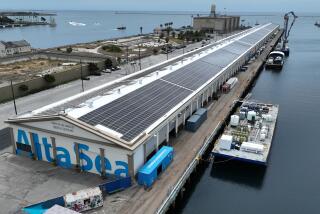The Wild Yonder : Mussel Men
- Share via
At 7 a.m., nine miles off Long Beach Harbor, an 85-foot transport pulls alongside the unloading deck of oil platform Elly. The ship discharges two enormous steel containers, which are lifted by crane onto the platform, and four men in their 20s. Employees of Ecomar Inc., a Santa Barbara-based company, they have come to harvest mussels.
Armed with a garden hoe and a suction hose, two of the men descend into the water and begin to chip away at the black Mediterranean mussels, which grow on the platform’s legs. As the mollusks give way, they are sucked into the hose and sent to the surface. There a third man examines them as they pass through a sorting machine. Broken mussels are removed. The rest drop into a plastic barrel which is emptied into one of the metal containers when full.
“This is a perfect mussel,” says Tony Haaland, holding up a long specimen that’s free of barnacles. Haaland, a commercial diver who has been with Ecomar for five years, oversees today’s operations, repairing damaged machinery, directing the divers and keeping an eye on the sea lions that doze nearby. It takes a crew of four, working three days a week, roughly four months to harvest a platform.
The brainchild of marine biologist Bob Meek, Ecomar has worked with CalResources, a subsidiary of Shell Oil Co., for three years. Their arrangement is simple: Ecomar removes the mollusks at no cost to the oil giant and sells the catch to fish markets and restaurants. “Before Ecomar, we had to hire commercial divers every six months to blast the mussels off with high-powered hoses,” says Bill Jones, operation supervisor for CalResources. “The mussels grew so fast that they’d weigh down the platforms and interfere with our operations.” Ecomar services all four of CalResources’ Southern California platforms as well as three owned by other companies, harvesting close to half a million pounds of mussels a year.
“When I first proposed the idea to CalResources, they said ‘No way, you can’t sell these mussels. They’ll taste terrible,’ ” says Meek. According to the state Department of Health Services, which regularly tests the shellfish and waters off the platforms, the mussels are safe. And, according to Corrado Gianotti, head chef at Newport Beach’s Tutto Mare Ristorante, one of the two dozen restaurants that buys from Ecomar: “The mussels are much meatier and tastier than the East Coast mussels we used to buy.”
After five hours underwater, the divers come up, sweating beneath their wet suits. The steel containers are transferred back to his ship, and 3,000 pounds of mussels are soon steaming their way to someone’s seafood risotto.
More to Read
Sign up for Essential California
The most important California stories and recommendations in your inbox every morning.
You may occasionally receive promotional content from the Los Angeles Times.










